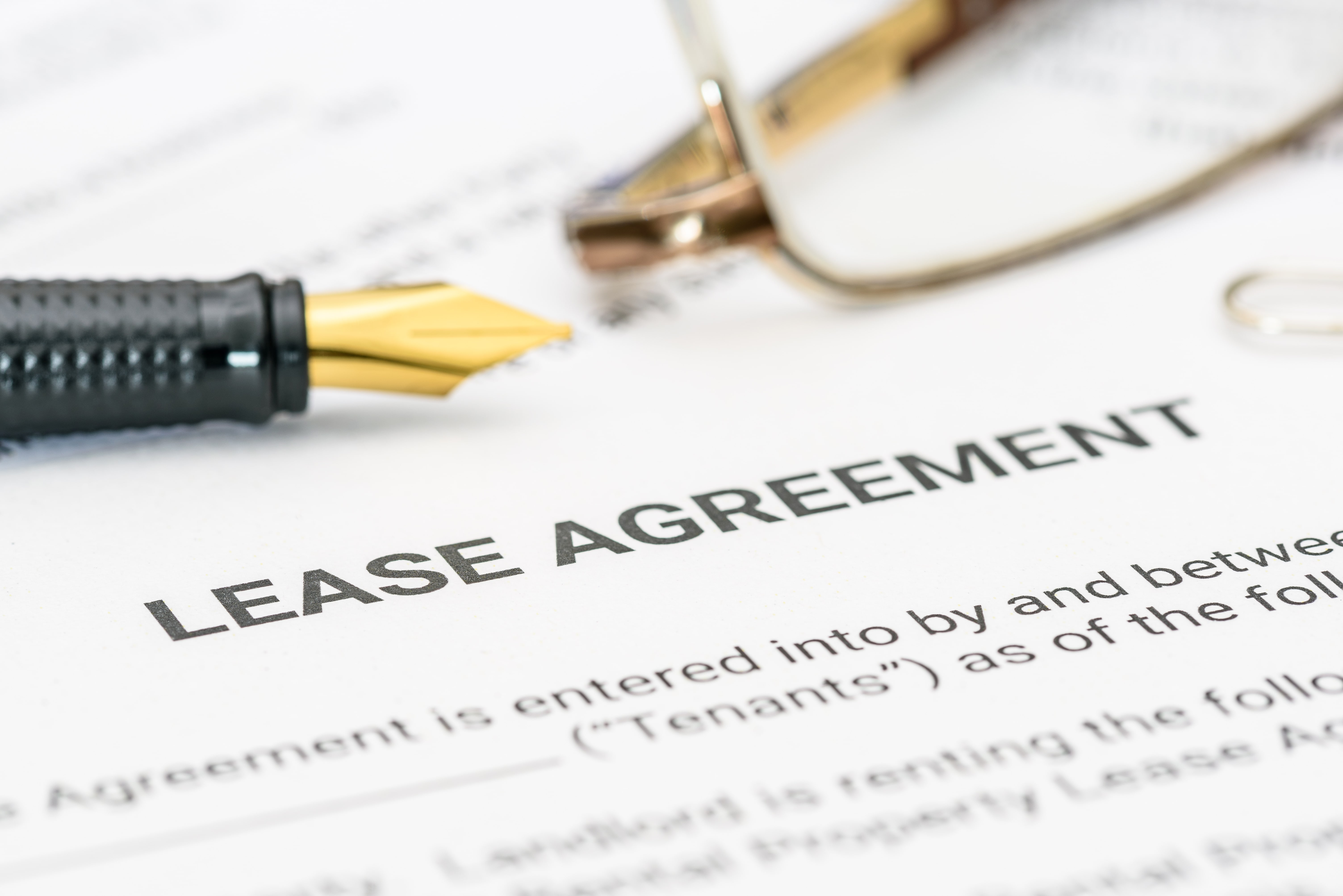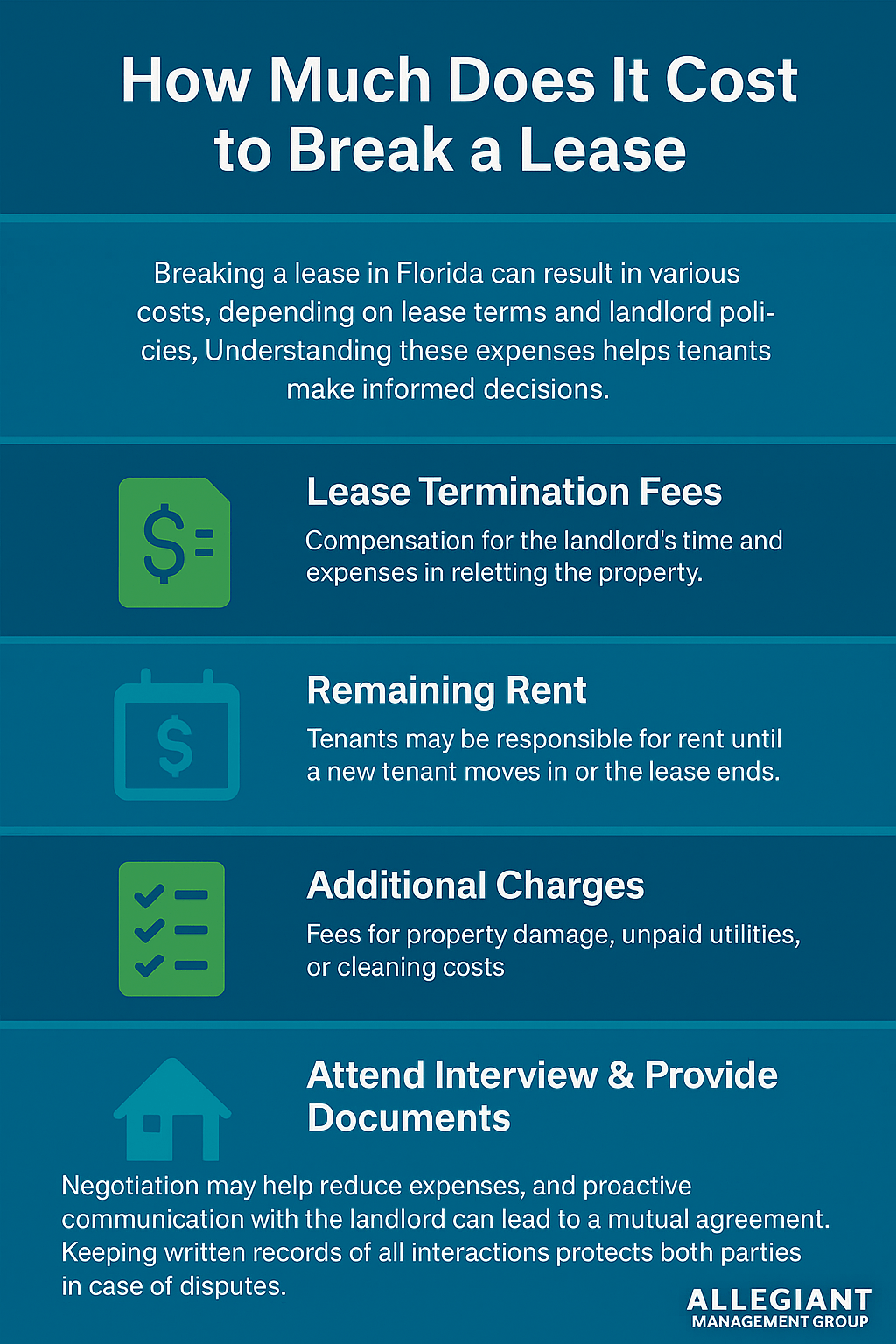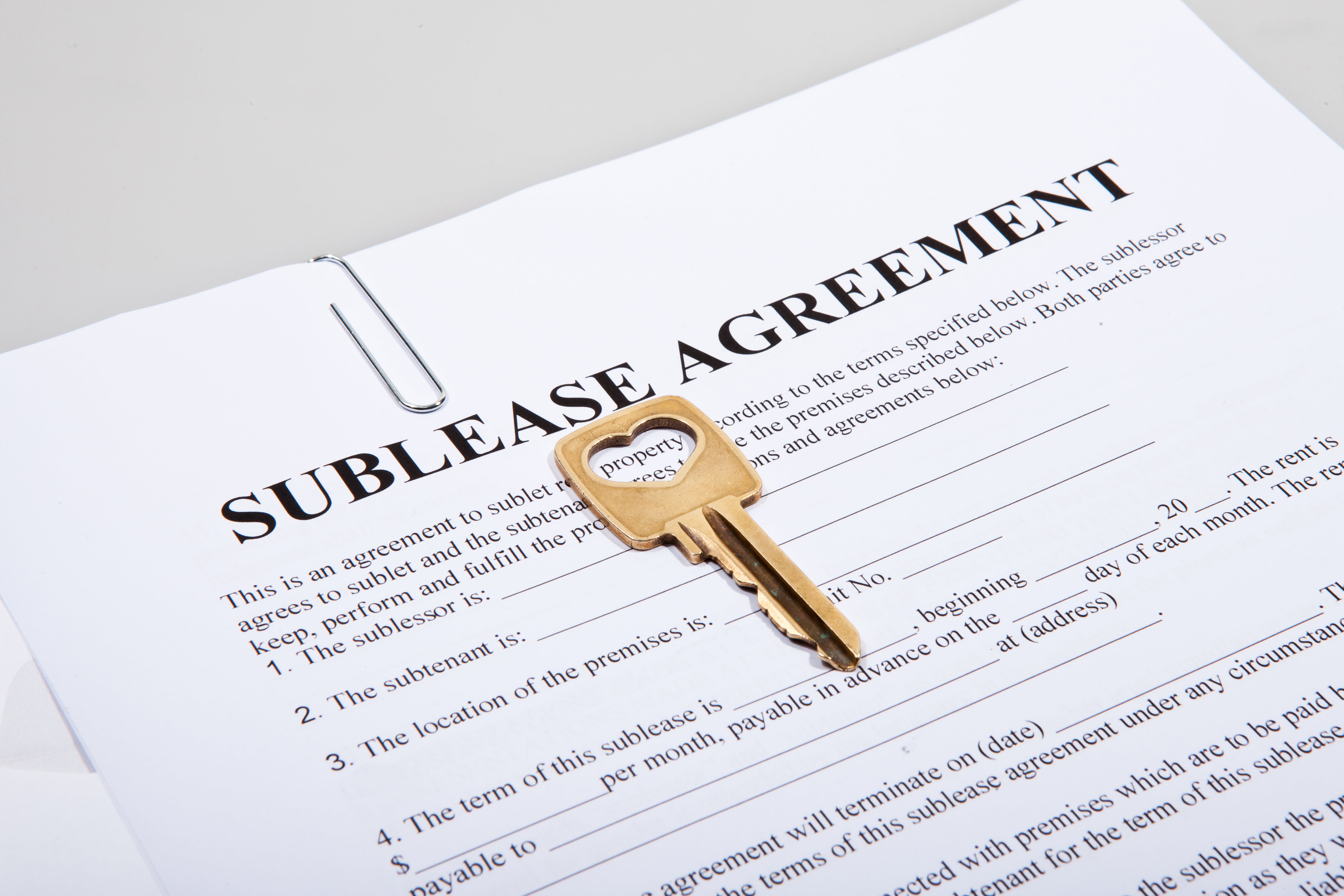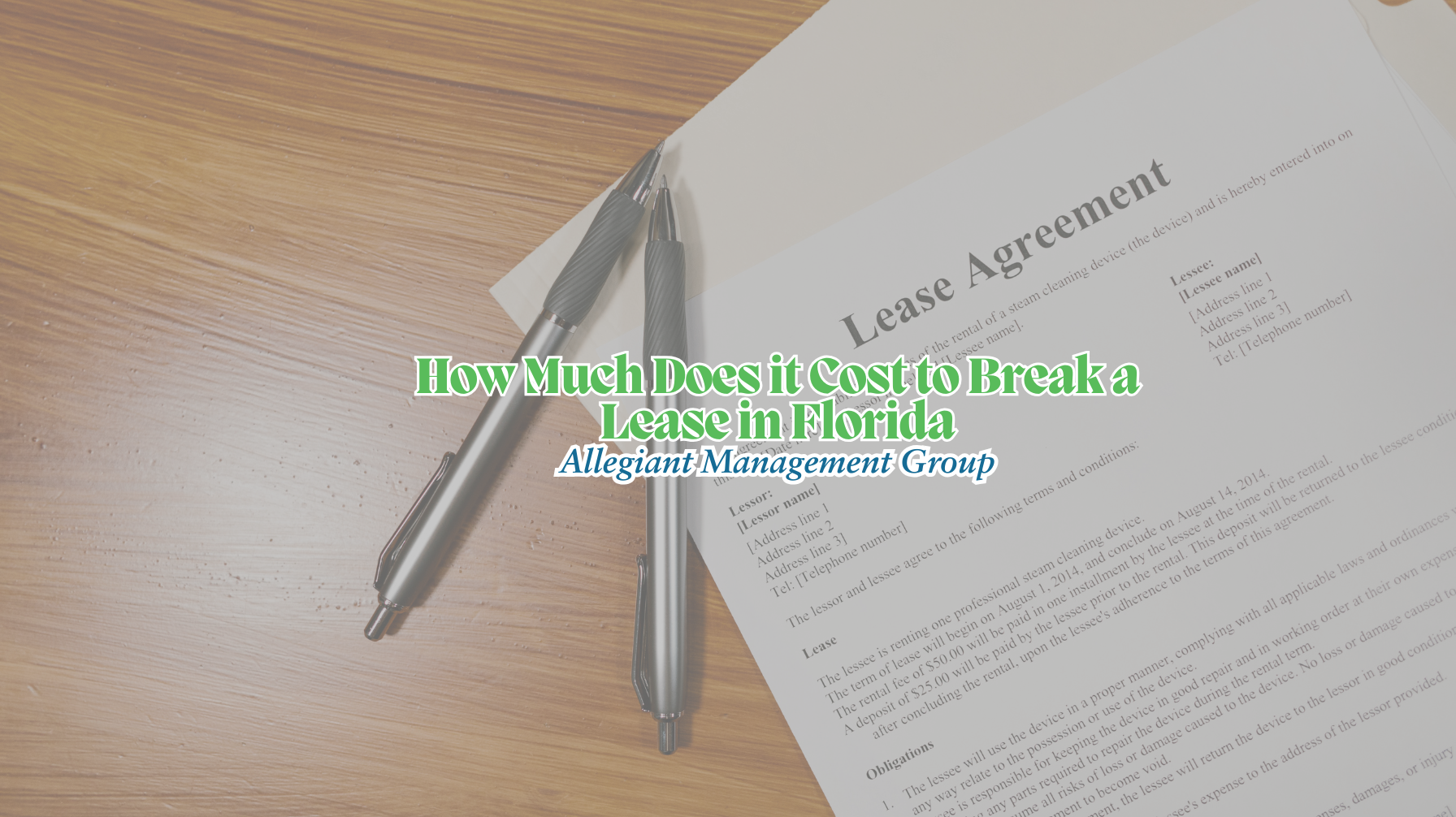Last Updated: July 21, 2025
📌 Table of Contents
- Understanding Lease Agreements in Florida
- How Much Does it Cost to Break a Lease in Florida
- Lease Termination Fees
- Remaining Rent Liability
- Additional Costs and Penalties
- Legal Grounds for Terminating a Lease Early
- Military Service and Other Statutory Rights
- Failure to Address Issues and Landlord Breaches
- Strategies to Minimize Costs and Legal Risks
- Negotiating with Landlords
- Subletting and Lease Assignment
- Impact on Credit Score and Rental History
- The Role of Property Managers in Lease Termination
- Preparing for Early Lease Termination
- Conclusion: Weighing the Costs and Making Informed Decisions
- Allegiant Management Handles Lease Terminations with Care
- Frequently Asked Questions (FAQs) - Breaking a Lease in Florida
Understanding How Much it May Cost to Break a Florida Lease Agreement

Breaking a rental property lease in Florida can be a complex process with financial and legal implications. The costs vary depending on lease terms, landlord policies, and state regulations.
This guide gives a clear overview of the costs of ending a lease agreement or rental agreement to help with financial planning. It also offers ways to reduce these costs and understand Florida landlord tenant law. Additionally, it covers legal points for tenants, landlords, and real estate experts.
Understanding Lease Agreements in Florida

Lease agreements are legally binding contracts that outline the rights and responsibilities of landlords and tenants. Before breaking a lease, or before you sign a lease, it’s crucial to review key terms of the lease, including:
- Lease duration and rent payment terms
- Early termination clauses and associated fees
- Notice requirements for ending the lease (30 days, 60 days, etc.)
- Landlord responsibilities for maintenance
Many leases have penalties for ending early. Tenants should read their lease carefully. If needed, they should seek a legal consultation.
By understanding lease agreements and planning carefully, tenants can handle lease terminations. This helps reduce financial and legal risks.
How Much Does it Cost to Break a Lease in Florida

Breaking a lease in Florida can result in various costs, depending on lease terms and landlord policies. Understanding these expenses helps tenants make informed decisions.
Common costs include:
- Lease termination fees – Compensation for the landlord’s time and expenses in reletting the property.
- Remaining rent – Tenants may be responsible for rent until a new tenant moves in or the lease ends.
- Additional charges – Fees for property damage, unpaid utilities, or cleaning costs.
Negotiation may help reduce expenses, and proactive communication with the landlord can lead to a mutual agreement. Keeping written records of all interactions protects both parties in case of disputes.
Planning ahead and understanding these costs can help minimize financial impact and ensure a smoother transition. Try to understand the landlords bottom line.

Lease Termination Fees

Lease termination fees vary but are usually a percentage of monthly rent or a flat rate. These fees compensate landlords for lost rent and turnover costs, such as advertising and finding a new tenant for the rental unit. The lease should specify any applicable charges, so tenants should clarify these details before proceeding.
Remaining Rent Liability

In Florida, tenants might need to pay rent until someone finds a new tenant. Some leases require payment until the lease expires unless the landlord fills the vacancy. Discussing the landlord’s efforts to re-rent the unit can help tenants understand their financial obligations.
If tenant fails to pay, an owner could seek a judgement if the lease includes a proper early termination form.
Additional Costs and Penalties
Breaking a lease can lead to costs beyond termination fees and rent. You may also owe unpaid utilities, cleaning fees, or charges for property damage. Addressing repairs before moving out can help avoid penalties.
Understanding the lease and communicating with the landlord can minimize unexpected expenses.
Legal Grounds for Terminating a Lease Early
Tenants in Florida may legally break a lease without penalties under specific circumstances. Understanding these legal grounds helps prevent disputes and ensures compliance with state laws.
Common allowable grounds for lease termination include:
- Active Military duty with deployment under the Servicemembers Civil Relief Act (SCRA)
- Violates Florida health and safety codes affecting livability
- Landlord harassment or illegal entry
Tenants should formally notify their landlord in writing and provide evidence when necessary. Keeping records of all communications helps protect their rights.
Military Service and Other Statutory Rights
Active service members can terminate a lease penalty-free if they receive deployment or transfer orders. You must provide proper notice, including a copy of the orders, to ensure compliance.
Other statutory rights may apply, such as protections for victims of domestic violence under certain conditions. Consulting tenant advocacy groups or legal professionals can provide further guidance. Consulting relevant statutes and seeking legal advice when necessary is important.
Failure to Address Issues and Landlord Breaches
Tenants have the right to a safe, habitable home. If a property lacks essential services or poses health risks, tenants may legally break the lease. Proper maintenance and compliance with health codes are landlord responsibilities.
When a landlord fails to address major issues, tenants should document problems with photos and maintenance logs. This evidence is crucial if disputes arise. Additionally, landlords must adhere to lease terms—harassment or illegal entry may justify lease termination. Consulting a legal professional ensures proper handling of the process.
Strategies to Minimize Costs and Legal Risks

Breaking a lease can be costly, but strategic planning can help minimize expenses and legal risks. Start by reviewing the lease agreement to understand termination clauses.
Timing is important. Ending a lease during busy rental seasons can help landlords find new tenants quickly. This makes them more willing to negotiate. Open communication with the landlord can also lead to a mutual agreement that reduces costs.
Explore legal options and tenant advocacy groups for support. Keeping records of discussions and agreements can prevent future disputes.
Negotiating with Landlords
Approach your landlord early to discuss lease termination. Clearly explain your situation and propose solutions, such as helping find a replacement tenant. A cooperative approach can increase the chances of reduced penalties.
Subletting and Lease Assignment

Subletting allows a tenant to transfer financial responsibility to a subtenant, avoiding lease termination. However, leases may require landlord approval. A lease assignment gives all responsibility to a new tenant. This frees the original tenant from obligations and legal issues.
Impact on Credit Score and Rental History
Breaking a lease can affect credit scores if unpaid rent is reported as a debt. It could put security deposits at risk. It may also impact rental history, making future leases harder to secure. Paying outstanding balances and maintaining open communication with landlords can help preserve financial and rental reputations.
The Role of Property Managers in Lease Termination
Property managers assist with lease transitions, helping tenants understand obligations and negotiate with landlords. They also connect tenants with replacement renters, minimizing vacancies and financial burdens.
Preparing for Early Lease Termination
Start by reviewing the lease for termination clauses. Prompt, clear communication with the landlord can lead to smoother negotiations. In complex cases, seeking legal advice ensures compliance and protects tenant rights. Be sure to provide written notice to your landlord for record keeping.
Conclusion: Weighing the Costs and Making Informed Decisions
Breaking a lease involves complex considerations. Weighing both financial and legal implications is crucial. By understanding potential costs, such as lease termination fees, you can prepare effectively and avoid constructive eviction.
Negotiation and legal advice can significantly alter your financial outcome. By taking strategic actions, you may reduce or even eliminate some expenses. Ensure you understand your rights under Florida law to make informed choices.
Ultimately, balancing costs against your reasons for leaving is vital. Consider how lease termination impacts your financial and personal situations. Careful evaluation will guide you toward a decision that aligns with your priorities and obligations.
Allegiant Management Handles Lease Terminations with Care
If you own property or rent in Florida, Allegiant Management Group can help you with lease agreements. Our experienced team provides expert property management services, ensuring compliance with lease terms and Florida landlord-tenant laws.
Contact us today. We can help you manage lease terminations and find the best solutions for your rental property needs!
Frequently Asked Questions (FAQs) - Breaking a Lease in Florida
How much does it cost to break lease?
Breaking a lease in Florida typically costs one to two months’ rent, depending on the lease agreement. Florida law does not make landlords find a new tenant to reduce damages. This means tenants may have to pay rent until the lease ends, unless there is an early termination clause.
How much does it usually cost to break a lease?
Breaking a lease in Florida typically costs one to two months’ rent, depending on the lease agreement. Florida landlords are not required to find a new tenant, so tenants may owe rent until the lease ends unless an early termination clause applies.
How to get out of a lease early?
To end a lease early, look for an early termination clause. You can also talk to your landlord or find someone to take your place. In some situations, you can end your lease without a penalty. This may happen for legal reasons, such as military duty or unsafe living conditions.
How much does it cost to break a lease early?
Breaking a lease early typically costs one to three months’ rent, depending on the lease agreement and state laws. Some landlords charge a flat fee to end the lease. Others make tenants pay rent until they find a new tenant or until the lease ends.
How do you break a lease agreement?
Get out of a lease by checking for an early termination clause, negotiating with your landlord, or finding a replacement tenant. Legal reasons like military deployment or uninhabitable conditions may allow you to break the lease without penalties.
Can a landlord get out of a lease agreement?
A landlord can terminate a lease agreement if the tenant violates lease terms, fails to pay rent, or damages the property. In some cases, landlords may negotiate a mutual termination. Local laws determine specific notice requirements and eviction procedures.
What is an early termination fee?
An early termination fee is a charge a tenant pays to break a lease before the agreed end date. This fee is usually one to three months' rent. It depends on the lease terms. The lease may include this in an early termination clause.
What is average cost of breaking a lease?
The average cost of breaking a lease is one to three months’ rent, depending on lease terms and state laws. Some landlords charge a flat fee to end the lease. Others want rent payments until a new tenant moves in or the lease ends.
How can you break a lease?
Break a lease by checking for an early termination clause, negotiating with your landlord, or finding a replacement tenant. Legal reasons like military deployment, domestic violence, or uninhabitable conditions may allow lease termination without penalties.
Disclaimer: This article is for information purposes only and does not constitute legal advice. Lease agreements and landlord-tenant laws can be different. Tenants should check their lease terms and talk to a lawyer for help. Allegiant Management Group is not responsible for any legal outcomes resulting from lease terminations.






